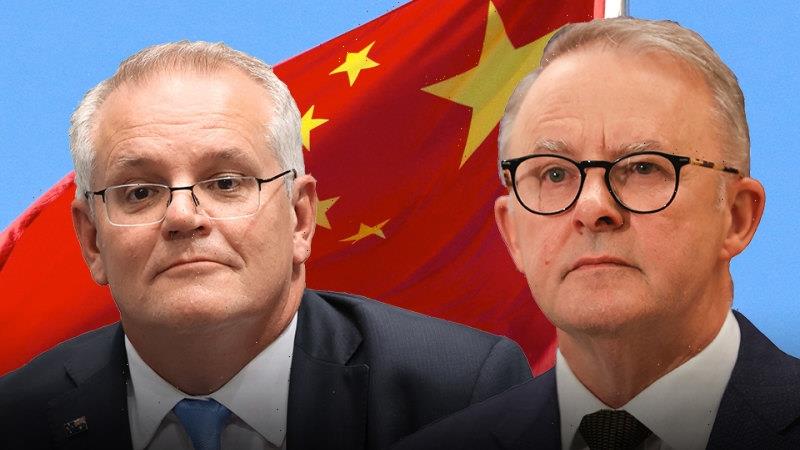If Scott Morrison and Anthony Albanese are serious about national security and the China challenge, they should have a proper debate.
The Prime Minister’s attacks on the Labor leader in recent weeks have been widely viewed as a cynical attempt to take advantage of anti-China sentiment in the suburbs, with some of Australia’s most experienced national security experts raising concern that he is politicising the issue.
Opposition leader Anthony Albanese and Prime Minister Scott Morrison are in a pitched battle over national security.Credit:Alex Ellinghausen, digitally altered
Morrison has accused Albanese of being the “Chinese government’s pick at this election”. He was this week forced to withdraw a reference to Labor’s deputy leader Richard Marles being a “Manchurian candidate” – a reference to a Cold War-era novel that more recently has become an insult used to describe someone as a puppet acting on behalf of an enemy power.
But instead of calling this out and quickly moving on, Albanese kicked the story along by disclosing three separate conversations he had with the ASIO director-general, and then by the end of the week stooped to the government’s deplorable level by throwing the “Manchurian candidate” accusation back at Morrison.
In truth, there is no substantive policy difference between the Coalition and Labor on any national security issue heading into this year’s election.
The Coalition’s argument centres on one of trust. They point to Albanese’s previous criticisms of the government’s handling of the China relationship to argue he cannot be trusted to stand up to Beijing’s coercion in government, as well as Labor’s record in government on funding the ADF and national security agencies.
For its part, Labor is merely pointing out that there is no difference in the policy positions of both sides, and says that Morrison is politicising national security.
Essentially, the Coalition is demanding that Labor has to agree with every single decision it has taken, and the opposition is insisting that it does.
What we are left with is a false and puerile debate.
We are not arguing how to best respond to China’s militarisation of the South China Sea, its human rights crackdown in Hong Kong and Xinjiang or its coercion against Taiwan. We are not debating what is the best response to Russia’s probable invasion of Ukraine, or the growing threat of foreign interference and violent ideological extremism.
Too often in national security policy, both sides of politics hide behind the veneer of “bipartisanship” so that they don’t have to engage in a proper debate.
This leads to key national security challenges, like how to handle China, to a debate among elites. Ordinary Australians don’t get a look-in, and the media don’t get to properly scrutinise alterative policies and approaches.
If Morrison and Albanese wanted a genuine debate, they should commit to delivering a national security statement to Parliament. This would include a grand strategy on how to handle the growing threat of a rising and more aggressive China over the coming decades.
On Sunday, a sliver of hope was on offer.
In his appearance on the ABC’s Insiders program, Liberal senator James Paterson gave a much more detailed, nuanced and credible criticism of Labor’s handling of the China challenge than Morrison or Defence Minister Peter Dutton have managed over the past week.
Over on Sky News, Labor frontbencher Michelle Rowland struck the right chord in expressing the seriousness of a Chinese Navy vessel’s action in aiming a military-grade laser at an RAAF P8 Poseidon aircraft while sailing through Australia’s Exclusive Economic Zone. Rowland also quickly pointed out the absurdity of the government’s rhetoric and a defence of Albanese’s patriotism, and then moved on to more substantive issues.
But we are worlds away from a proper debate.
Our Breaking News Alert will notify you of significant breaking news when it happens. Get it here.
Most Viewed in Politics
From our partners
Source: Read Full Article

